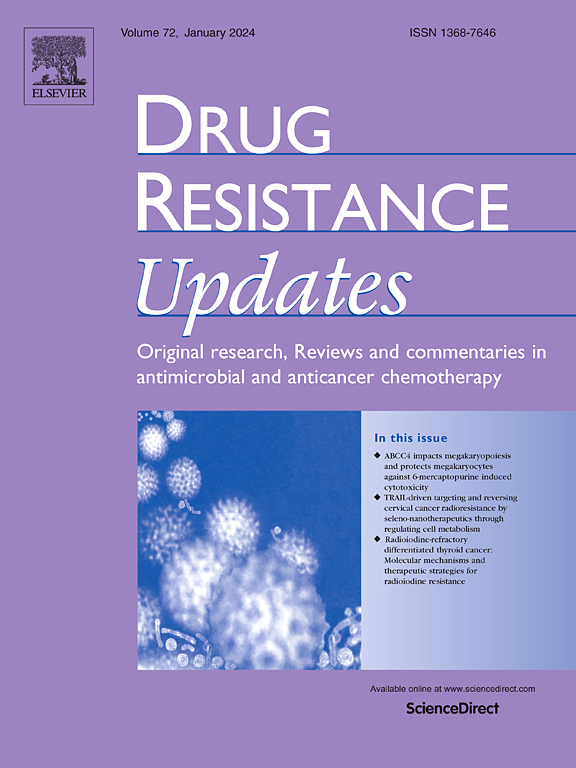理想的两亲体和蛋白酶抑制剂的关联:赋予抗菌肽在生理条件下具有稳定的抗菌活性,以对抗多重耐药细菌。
IF 15.8
1区 医学
Q1 PHARMACOLOGY & PHARMACY
引用次数: 0
摘要
目的:抗菌肽(AMPs)在生理条件下不稳定的抗菌活性(尤其是降解引发的蛋白酶)似乎是其在临床试验中成功实施的持续障碍。因此,我们的目标是设计AMP工程框架,可以在生理环境中保持强大的抗菌功效。方法:通过理想的两亲体与胰蛋白酶抑制剂的结合,在生理屏障下获得具有稳定抗菌活性的抗菌肽。结果:我们筛选并鉴定了IK3-A和IK3-S先导肽,它们对革兰氏阴性菌(包括耐多药细菌)具有有效的活性,并且与哺乳动物细胞具有良好的生物相容性。值得注意的是,IK3-A和IK3-S在生理盐、血清和蛋白酶条件下保持了持续的抗菌效力。此外,IK3-A和IK3-S通过攻击细菌细胞膜并诱导氧化损伤(高浓度)杀死革兰氏阴性细菌。关键是,IK3-A和IK3-S在小鼠中具有最佳的安全性和有效性。结论:本文首次比较了不同胰蛋白酶抑制剂对AMPs在同一序列平台上的蛋白酶水解抗性的影响。综上所述,这些发现为生理条件下抗菌活性稳定的抗菌肽分子设计提供了指导,并促进了抗菌肽作为耐多药耐药细菌抗菌生物材料的临床转化过程。此外,这可能会激发人们对蛋白酶抑制剂作为制造高度稳定的肽基生物材料的分子支架的更普遍的兴趣。本文章由计算机程序翻译,如有差异,请以英文原文为准。
Association of idealized amphiphiles and protease inhibitors: Conferring antimicrobial peptides with stable antibacterial activity under physiological conditions to combat multidrug-resistant bacteria
Aims
The unstable antimicrobial activity of antimicrobial peptides (AMPs) under physiological conditions (especially the degradation instigated proteases) seems to be a persistent impediment for their successful implementation in clinical trials. Consequently, our objective was to devise AMP engineering frameworks that could sustain robust antibacterial efficacy within physiological environments.
Methods
In this work, we harvested AMPs with stable antimicrobial activity under the physiological barriers through the combination of idealized amphiphiles and trypsin inhibitors.
Results
We screened and identified the lead peptides IK3-A and IK3-S, which showed potent activity against Gram-negative bacteria, including multidrug-resistant (MDR) bacteria, and exhibited promising biocompatibility with mammalian cells. Remarkably, IK3-A and IK3-S maintained sustained antibacterial potency under physiological salts, serum, and protease conditions. Furthermore, both IK3-A and IK3-S kill Gram-negative bacteria by attacking the bacterial cell membrane and inducing oxidative damage (at high concentrations). Crucially, IK3-A and IK3-S have optimal safety and efficacy in mice.
Conclusions
This is the first work to compare the effects of different trypsin inhibitors on the resistance of AMPs to protease hydrolysis on the same sequence platform. In conclusion, these findings provide guidance for the molecular design of AMPs with stable antibacterial activity under physiological conditions and facilitates the process of clinical translation of AMPs as antimicrobial biomaterials against MDR bacteria. Moreover, this may stimulate a more general interest in protease inhibitors as molecular scaffolds in the creation of highly stable peptide-based biomaterials.
求助全文
通过发布文献求助,成功后即可免费获取论文全文。
去求助
来源期刊

Drug Resistance Updates
医学-药学
CiteScore
26.20
自引率
11.90%
发文量
32
审稿时长
29 days
期刊介绍:
Drug Resistance Updates serves as a platform for publishing original research, commentary, and expert reviews on significant advancements in drug resistance related to infectious diseases and cancer. It encompasses diverse disciplines such as molecular biology, biochemistry, cell biology, pharmacology, microbiology, preclinical therapeutics, oncology, and clinical medicine. The journal addresses both basic research and clinical aspects of drug resistance, providing insights into novel drugs and strategies to overcome resistance. Original research articles are welcomed, and review articles are authored by leaders in the field by invitation.
Articles are written by leaders in the field, in response to an invitation from the Editors, and are peer-reviewed prior to publication. Articles are clear, readable, and up-to-date, suitable for a multidisciplinary readership and include schematic diagrams and other illustrations conveying the major points of the article. The goal is to highlight recent areas of growth and put them in perspective.
*Expert reviews in clinical and basic drug resistance research in oncology and infectious disease
*Describes emerging technologies and therapies, particularly those that overcome drug resistance
*Emphasises common themes in microbial and cancer research
 求助内容:
求助内容: 应助结果提醒方式:
应助结果提醒方式:


